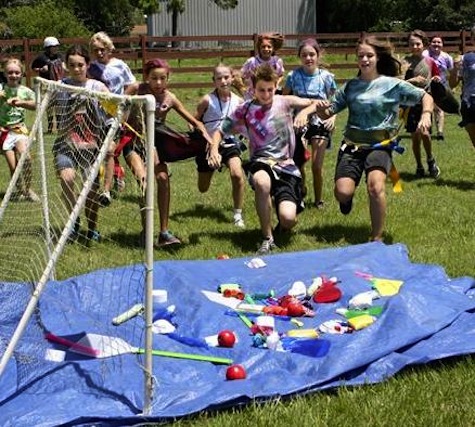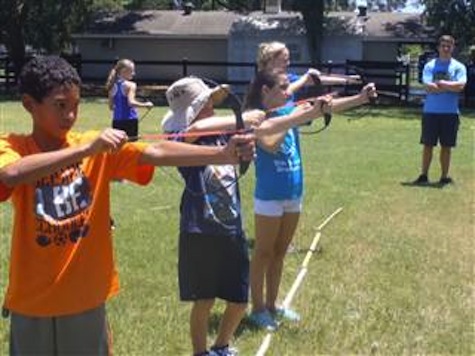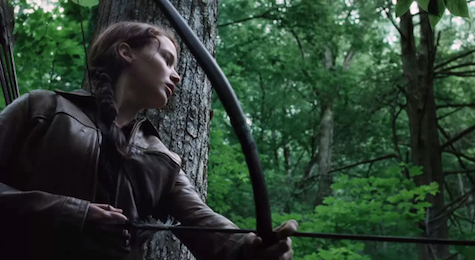A few weeks ago, Country Day Montessori school hosted their second-annual “Hunger Games Summer Camp” and were suddenly met with a flurry of horrified reactions after a hand-wringing article by the Tampa Bay Times Tribune, which concluded with a boy being knocked over during a game of capture-the-flag. And on the surface, “Hunger Games Summer Camp” does sound a little…questionable? But it also seemed like an innovative way to integrate a thoughtful work of literature into a child’s every day experience.
Many works of children’s and YA literature are violent—people die in the Harry Potter universe as well, but no one gets upset about Muggle Quidditch. I was intrigued by the backlash against the camp, and wanted to know how they dealt with those questions of violence, and why, of all the books they could have structured their camp around, they chose Suzanne Collins’ dystopia?
 The first question, obviously, is why The Hunger Games? The head of Country Day, Ted Gillette, responded that the story worked for them on two levels. It fit the practical needs of the camp, because they have a “14-acre campus with a small animal farm” (although honestly, the idea of setting a dystopian allegory on an animal farm just seems silly), but more importantly it allowed them to teach their campers about a society stricken by poverty. The directors wanted to emphasise the idea that “the tributes had to live off the land” rather than just provide campers with static games and craft lessons.
The first question, obviously, is why The Hunger Games? The head of Country Day, Ted Gillette, responded that the story worked for them on two levels. It fit the practical needs of the camp, because they have a “14-acre campus with a small animal farm” (although honestly, the idea of setting a dystopian allegory on an animal farm just seems silly), but more importantly it allowed them to teach their campers about a society stricken by poverty. The directors wanted to emphasise the idea that “the tributes had to live off the land” rather than just provide campers with static games and craft lessons.
To this end they opened the camp with a Reaping Ceremony, in which children were chosen to represent each District. The campers were expected to make T-shirts and banners to represent their District, and “as each tribute brought their character to life throughout the week, they learned about the different industries their district specialized in.” The counselors got into the spirit as well, dressing as Effie Trinket and Mayor Undersee, and passages were read aloud from The Hunger Games, highlighting the extreme financial gap between the Capitol and the Districts.
In addition to learning about each district’s trade, the campers were given challenges that related to the book, such as “designing an effective bow and finding the angle to shoot the ‘arrow’ the farthest.” Other activities altered some aspects of the story to encourage cooperation—rather than strategically using landmines to hoard food, teams were “challenged with the task of guiding their [blindfolded] partner through a ‘minefield’ plagued with cones, balls and hula hoops.” The challenges the camp presented were varied, including mental tests like Hunger Games Jeopardy, which specifically “required knowledge from the book that was not in the movie,” and physical activities such as target practice, shelter building, and “Boot Camp in the Mud” which I’m guessing was just as awesome as it sounds.
 The funny thing is that despite all the media backlash against the camp, there were no complaints of violence from the kids or the parents. Moreover, this was the camp’s second Hunger Games-themed year, and the initial enrollment cap of 18 had to be increased to 26 due of popular demand. A few outlets reported that the rules of the games were revised after the intial article, but the camp later said that wasn’t the case—they had already modified their game of capture-the-flag so that kids wouldn’t be put in harm’s way.
The funny thing is that despite all the media backlash against the camp, there were no complaints of violence from the kids or the parents. Moreover, this was the camp’s second Hunger Games-themed year, and the initial enrollment cap of 18 had to be increased to 26 due of popular demand. A few outlets reported that the rules of the games were revised after the intial article, but the camp later said that wasn’t the case—they had already modified their game of capture-the-flag so that kids wouldn’t be put in harm’s way.
When the camp was featured on The Today Show (in a spot that, while more positive than the initial newspaper article, was still a bit bemused by the theme), the campers and their parents seemed happy with their experience. Given that, why was Country Day suddenly a target for criticism? Was this simply an excuse for people in more rational states to point and giggle about the weirdness of Florida? Or is this part of a larger adult fear that children can’t actually understand the literature and film directed at them?
Personally, having grown up as a nerd in Florida, with equally nerdy friends, my experience was that kids thrived on stories that encouraged them to question society through the removed settings of sci-fi, fantasy, and horror. Isn’t this precisely what we want our future generations to be able to do? Or is there a point where even dystopias become too violent, and too hopeless?
Leah Schnelbach grew up in Central Florida, and would like to register her deep sadness that “Hunger Games Camp” was not an option when she lived there.










